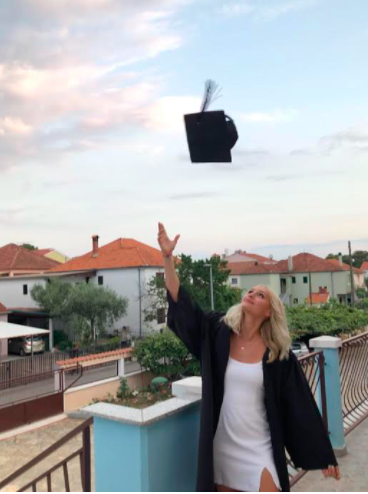UA News

UA Alumni:Emily Faux
Emily was a Highly Commended Entrant in the Politics & International Relations category in 2020
Since the awards, Emily graduated with first-class honours in International Relations BA.
She is currently studying an MA in Political Communication in order to better understand the role of narrative, story-telling, popular culture, and visual communication in the legitimisation of nuclear weapons.
What are you doing now and what has happened since the award?
Since being Highly Commended by the Global Undergraduate Awards in my first year of university a lot has changed, not least with my second and final year of undergraduate studying being hit by the pandemic.
I finished university, like many others, with an electronic submission from my bedroom. Despite these challenges, I graduated in July 2021 with a First Class Honours in International Relations BA.
A week into my celebrations, I received the news that I had graduated at the top of both my degree cohort (students of International Relations) and overall School (students of Politics, International Relations, and International Development).
Is there anything else you have achieved since the awards?
I was selected as a mentee in the first cohort of The Young Women in Non-Proliferation and Disarmament (YWNPD) Mentorship Scheme established by the Vienna Center for Disarmament and Non-Proliferation (VCDNP) and the International Affairs Institute (IAI).
Through my mentor and fellow mentees, I have been connected with powerful women from around the world who share my commitment to a peaceful future and human security.
I am also the President of the Leeds branch of the International Student/Young Pugwash – an organisation committed to using scientific expertise to inform the government and the public about issues relating to weapons of mass destruction, war and peace, the environment, and the social responsibility of scientists.
In this role, I have met the Shadow minister for Peace and Disarmament, Fabian Hamilton MP, and collaborated to organise events that raise awareness about Britain’s nuclear weapons programme.
I was also awarded a scholarship equal to the UKIR stipend to fund my MA in Political Communication and throughout this I have been working on a PhD proposal that navigates the relationship between nuclear weapons and popular culture, asking how representations of the bomb (re)produce narratives that sustain nuclear weapons.
For this research, I have already been invited to present at the University of Glasgow’s Future of Nuclear Disarmament workshop and the University of Leicester’s Technology and Peace conference.

Where do your interests lie?
My interest in International Relations centres around Security Studies. After taking a module in college called “Nuclear Weapons and Global Politics”, I developed a huge passion for nuclear non-proliferation and disarmament. I am now a huge advocate for increasing young people’s engagement with nuclear weapons. My generation has grown up fearing terrorism and climate change, not nuclear war. With the only military use of nuclear weapons 55 years before my birthday, it is easy to see how nukes have become forgotten artefacts of a bygone era.
However, nuclear weapons are more of a threat today than ever before, the public is just largely unaware of this. Every nuclear weapon state is expanding and/or modernising is nuclear capabilities. These weapons are vulnerable to terrorist attacks, accidents, computer-system failures, and human error. Their use can destroy the entire planet many times – some have even hypothesised the destruction of the solar system.
Has receiving an award for your hard work helped? How?
In many ways, my academic journey began with recognition by the Global Undergraduate Awards. Being Highly Commended was the first time that I felt my voice on global security issues counted. It was the first time that being a young woman did not feel like a reason to stay silent in the world of guns, bombs, and terror, but a reason to speak and be listened to. My award let me, as an 18 year-old who was interested in issues that felt far too big for her, understand that I had knowledge that mattered and opinions that were important.
Why should students submit their work?
I can’t recommend submitting to the Global Undergraduate Awards more – there’s nothing to lose, and so much self-confidence to gain. If someone had told me when I was 18 that by the time I was 21 I would be an active member of non-proliferation academic, professional, and activist circles, confident enough to chat with MPs and tell nuclear scientists why they should care about popular culture, I wouldn’t have even known what “non-proliferation” meant.
But with recognition, encouragement, and self-belief –beginning with the Global Undergraduate Awards – I have found my passion and the confidence to share my voice with others.
